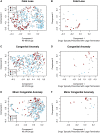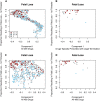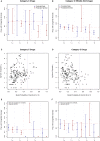Development of A Machine Learning Algorithm to Classify Drugs Of Unknown Fetal Effect
- PMID: 28993650
- PMCID: PMC5634437
- DOI: 10.1038/s41598-017-12943-x
Development of A Machine Learning Algorithm to Classify Drugs Of Unknown Fetal Effect
Abstract
Many drugs commonly prescribed during pregnancy lack a fetal safety recommendation - called FDA 'category C' drugs. This study aims to classify these drugs into harmful and safe categories using knowledge gained from chemoinformatics (i.e., pharmacological similarity with drugs of known fetal effect) and empirical data (i.e., derived from Electronic Health Records). Our fetal loss cohort contains 14,922 affected and 33,043 unaffected pregnancies and our congenital anomalies cohort contains 5,658 affected and 31,240 unaffected infants. We trained a random forest to classify drugs of unknown pregnancy class into harmful or safe categories, focusing on two distinct outcomes: fetal loss and congenital anomalies. Our models achieved an out-of-bag accuracy of 91% for fetal loss and 87% for congenital anomalies outperforming null models. Fifty-seven 'category C' medications were classified as harmful for fetal loss and eleven for congenital anomalies. This includes medications with documented harmful effects, including naproxen, ibuprofen and rubella live vaccine. We also identified several novel drugs, e.g., haloperidol, that increased the risk of fetal loss. Our approach provides important information on the harmfulness of 'category C' drugs. This is needed, as no FDA recommendation exists for these drugs' fetal safety.
Conflict of interest statement
The authors declare that they have no competing interests.
Figures






Similar articles
-
Drug use during pregnancy and breast-feeding. A classification system for drug information.Acta Obstet Gynecol Scand Suppl. 1984;126:1-55. doi: 10.3109/00016348409156383. Acta Obstet Gynecol Scand Suppl. 1984. PMID: 6393685 Clinical Trial.
-
Fetal health status prediction based on maternal clinical history using machine learning techniques.Comput Methods Programs Biomed. 2018 Sep;163:87-100. doi: 10.1016/j.cmpb.2018.06.010. Epub 2018 Jun 14. Comput Methods Programs Biomed. 2018. PMID: 30119860
-
Drugs during pregnancy: an issue of risk classification and information to prescribers.Drug Saf. 1996 Feb;14(2):69-77. doi: 10.2165/00002018-199614020-00001. Drug Saf. 1996. PMID: 8852521 Review.
-
IMPACT OF REAL-LIFE ENVIRONMENTAL EXPOSURES ON REPRODUCTION: A contemporary review of machine learning to predict adverse pregnancy outcomes from pharmaceuticals, including DDIs.Reproduction. 2024 Nov 15;168(6):e240183. doi: 10.1530/REP-24-0183. Print 2024 Dec 1. Reproduction. 2024. PMID: 39374154 Review.
-
Risk classification systems for drug use during pregnancy: are they a reliable source of information?Drug Saf. 2000 Sep;23(3):245-53. doi: 10.2165/00002018-200023030-00006. Drug Saf. 2000. PMID: 11005706
Cited by
-
Data-driven queries between medications and spontaneous preterm birth among 2.5 million pregnancies.Birth Defects Res. 2019 Oct 1;111(16):1145-1153. doi: 10.1002/bdr2.1580. Epub 2019 Aug 21. Birth Defects Res. 2019. PMID: 31433567 Free PMC article.
-
Machine learning on drug-specific data to predict small molecule teratogenicity.Reprod Toxicol. 2020 Aug;95:148-158. doi: 10.1016/j.reprotox.2020.05.004. Epub 2020 May 16. Reprod Toxicol. 2020. PMID: 32428651 Free PMC article.
-
Using Machine Learning to Predict Complications in Pregnancy: A Systematic Review.Front Bioeng Biotechnol. 2022 Jan 19;9:780389. doi: 10.3389/fbioe.2021.780389. eCollection 2021. Front Bioeng Biotechnol. 2022. PMID: 35127665 Free PMC article. Review.
-
ODAL: A one-shot distributed algorithm to perform logistic regressions on electronic health records data from multiple clinical sites.Pac Symp Biocomput. 2019;24:30-41. Pac Symp Biocomput. 2019. PMID: 30864308 Free PMC article.
-
Data-Driven Modeling of Pregnancy-Related Complications.Trends Mol Med. 2021 Aug;27(8):762-776. doi: 10.1016/j.molmed.2021.01.007. Epub 2021 Feb 8. Trends Mol Med. 2021. PMID: 33573911 Free PMC article. Review.
References
Publication types
MeSH terms
Grants and funding
LinkOut - more resources
Full Text Sources
Other Literature Sources
Medical

